Organisational Behaviour Report: Deloitte's Performance Factors
VerifiedAdded on 2023/06/07
|16
|4644
|243
Report
AI Summary
This report provides a comprehensive analysis of organisational behaviour, focusing on the case of Deloitte. It begins by examining the impact of organisational culture, power, and politics on team and individual behaviour, exploring concepts such as power culture, person culture, role culture, and task culture, alongside the influences of 'the woods,' 'the rock,' 'the high grounds,' and 'the weeds'. The report then delves into motivational theories, including Maslow's hierarchy of needs, McClelland's theory, Skinner's reinforcement theory, and Vroom's expectancy theory, illustrating how these theories and techniques enable the attainment of organisational goals. Furthermore, it investigates the factors that contribute to effective versus ineffective teams, discussing phases like forming, storming, and norming. Finally, the report applies the concepts and philosophies of organisational behaviour within Deloitte, assessing how these concepts inform and influence behaviour, ultimately aiming to provide insights into the company's team dynamics, performance, and strategies.
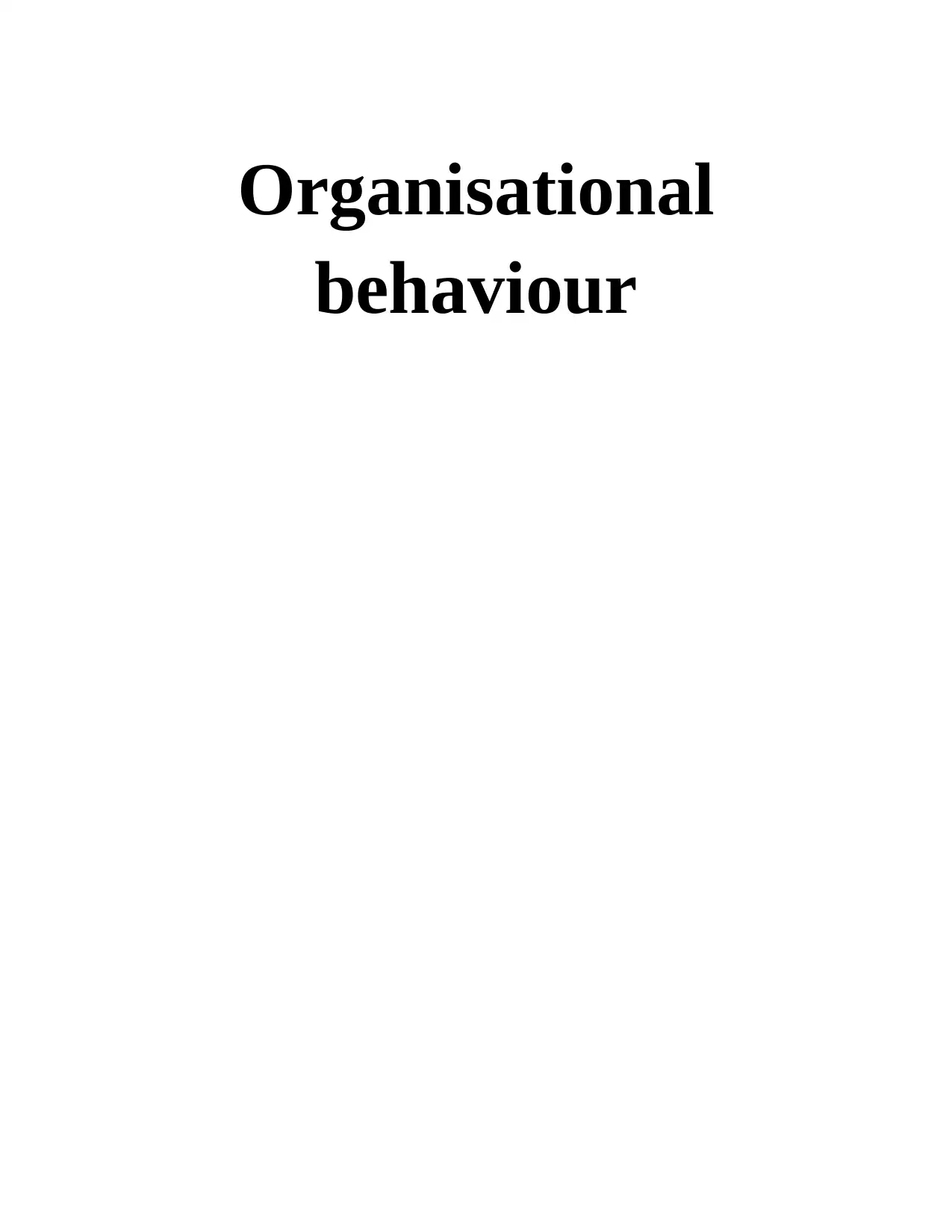
Organisational
behaviour
behaviour
Paraphrase This Document
Need a fresh take? Get an instant paraphrase of this document with our AI Paraphraser
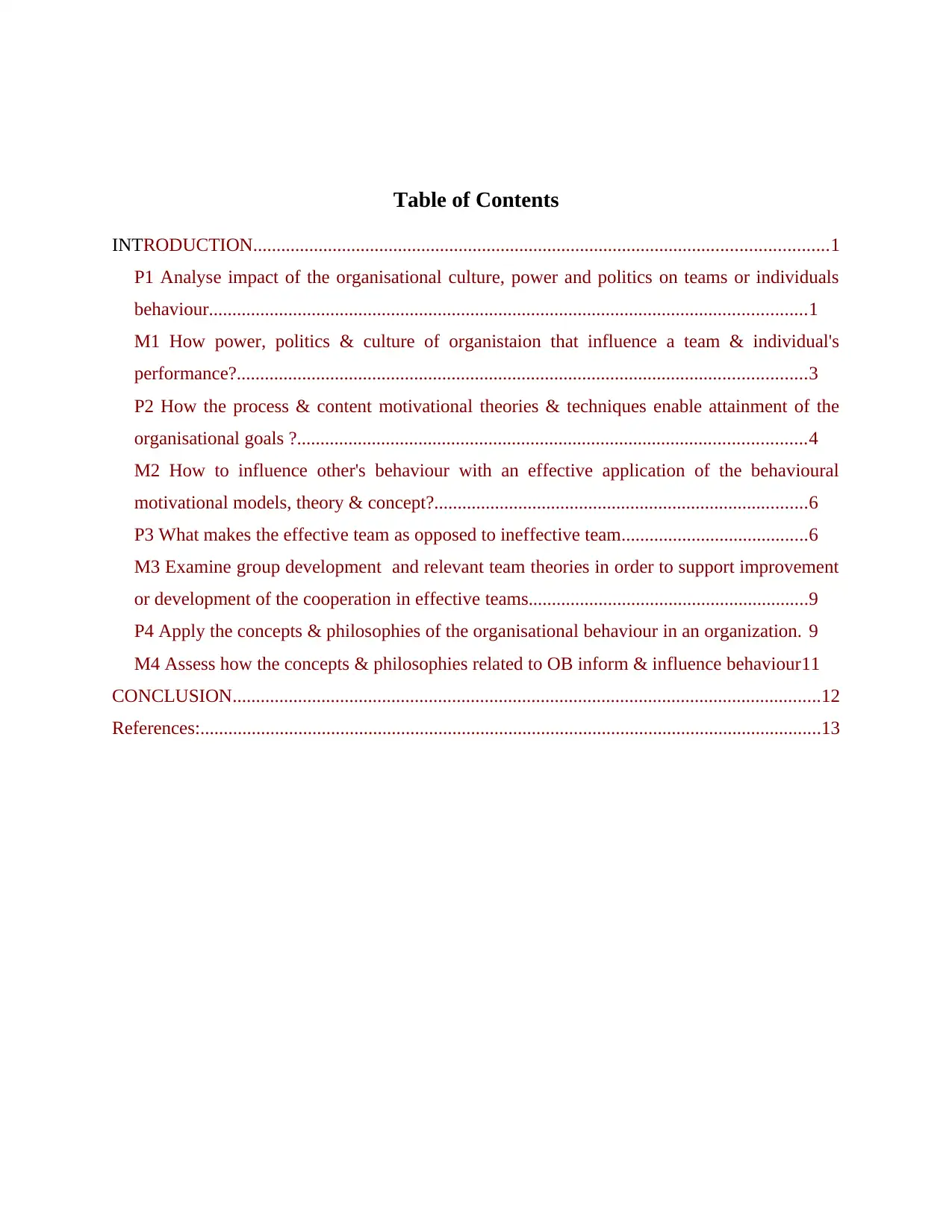
Table of Contents
INTRODUCTION...........................................................................................................................1
P1 Analyse impact of the organisational culture, power and politics on teams or individuals
behaviour................................................................................................................................1
M1 How power, politics & culture of organistaion that influence a team & individual's
performance?..........................................................................................................................3
P2 How the process & content motivational theories & techniques enable attainment of the
organisational goals ?.............................................................................................................4
M2 How to influence other's behaviour with an effective application of the behavioural
motivational models, theory & concept?................................................................................6
P3 What makes the effective team as opposed to ineffective team........................................6
M3 Examine group development and relevant team theories in order to support improvement
or development of the cooperation in effective teams............................................................9
P4 Apply the concepts & philosophies of the organisational behaviour in an organization. 9
M4 Assess how the concepts & philosophies related to OB inform & influence behaviour11
CONCLUSION..............................................................................................................................12
References:.....................................................................................................................................13
INTRODUCTION...........................................................................................................................1
P1 Analyse impact of the organisational culture, power and politics on teams or individuals
behaviour................................................................................................................................1
M1 How power, politics & culture of organistaion that influence a team & individual's
performance?..........................................................................................................................3
P2 How the process & content motivational theories & techniques enable attainment of the
organisational goals ?.............................................................................................................4
M2 How to influence other's behaviour with an effective application of the behavioural
motivational models, theory & concept?................................................................................6
P3 What makes the effective team as opposed to ineffective team........................................6
M3 Examine group development and relevant team theories in order to support improvement
or development of the cooperation in effective teams............................................................9
P4 Apply the concepts & philosophies of the organisational behaviour in an organization. 9
M4 Assess how the concepts & philosophies related to OB inform & influence behaviour11
CONCLUSION..............................................................................................................................12
References:.....................................................................................................................................13
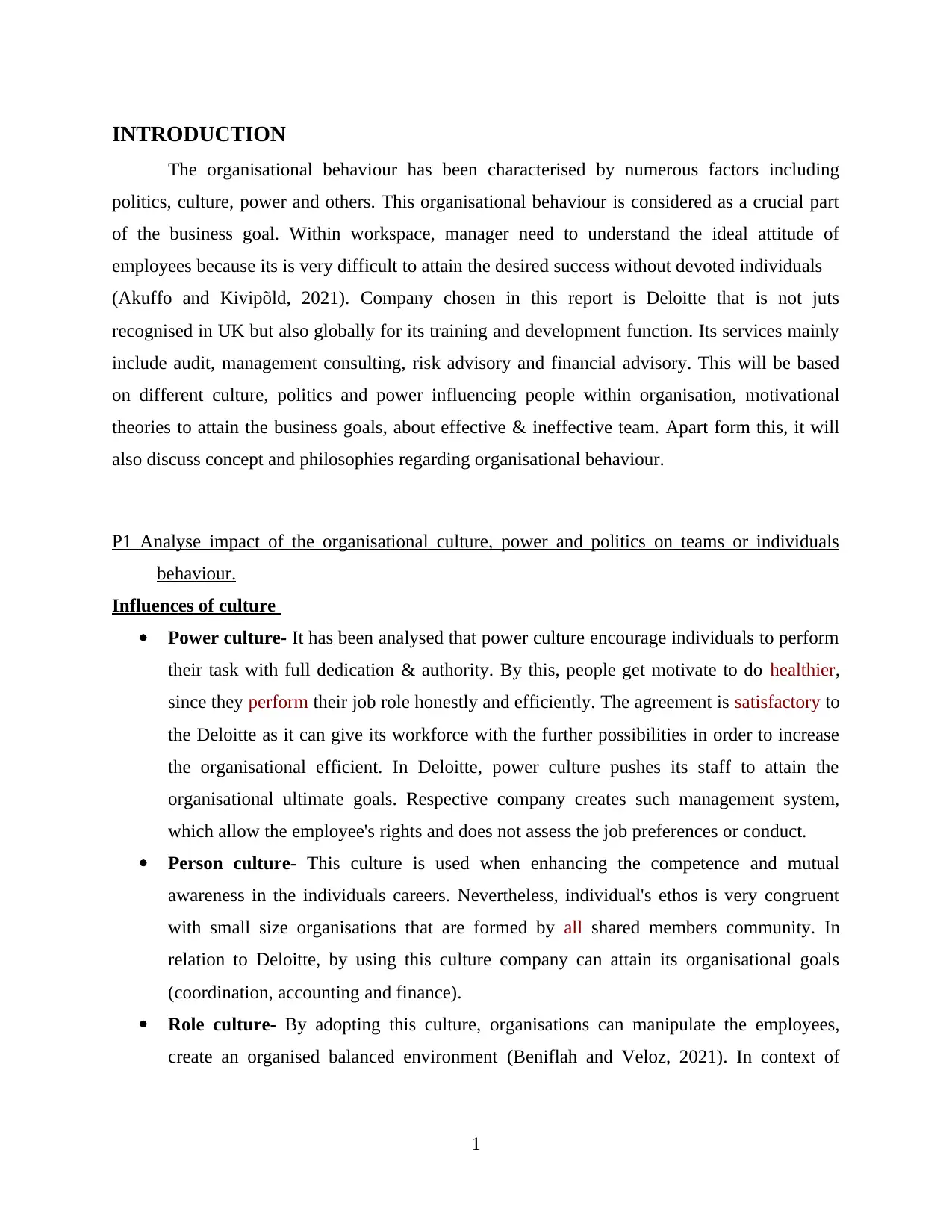
INTRODUCTION
The organisational behaviour has been characterised by numerous factors including
politics, culture, power and others. This organisational behaviour is considered as a crucial part
of the business goal. Within workspace, manager need to understand the ideal attitude of
employees because its is very difficult to attain the desired success without devoted individuals
(Akuffo and Kivipõld, 2021). Company chosen in this report is Deloitte that is not juts
recognised in UK but also globally for its training and development function. Its services mainly
include audit, management consulting, risk advisory and financial advisory. This will be based
on different culture, politics and power influencing people within organisation, motivational
theories to attain the business goals, about effective & ineffective team. Apart form this, it will
also discuss concept and philosophies regarding organisational behaviour.
P1 Analyse impact of the organisational culture, power and politics on teams or individuals
behaviour.
Influences of culture
Power culture- It has been analysed that power culture encourage individuals to perform
their task with full dedication & authority. By this, people get motivate to do healthier,
since they perform their job role honestly and efficiently. The agreement is satisfactory to
the Deloitte as it can give its workforce with the further possibilities in order to increase
the organisational efficient. In Deloitte, power culture pushes its staff to attain the
organisational ultimate goals. Respective company creates such management system,
which allow the employee's rights and does not assess the job preferences or conduct.
Person culture- This culture is used when enhancing the competence and mutual
awareness in the individuals careers. Nevertheless, individual's ethos is very congruent
with small size organisations that are formed by all shared members community. In
relation to Deloitte, by using this culture company can attain its organisational goals
(coordination, accounting and finance).
Role culture- By adopting this culture, organisations can manipulate the employees,
create an organised balanced environment (Beniflah and Veloz, 2021). In context of
1
The organisational behaviour has been characterised by numerous factors including
politics, culture, power and others. This organisational behaviour is considered as a crucial part
of the business goal. Within workspace, manager need to understand the ideal attitude of
employees because its is very difficult to attain the desired success without devoted individuals
(Akuffo and Kivipõld, 2021). Company chosen in this report is Deloitte that is not juts
recognised in UK but also globally for its training and development function. Its services mainly
include audit, management consulting, risk advisory and financial advisory. This will be based
on different culture, politics and power influencing people within organisation, motivational
theories to attain the business goals, about effective & ineffective team. Apart form this, it will
also discuss concept and philosophies regarding organisational behaviour.
P1 Analyse impact of the organisational culture, power and politics on teams or individuals
behaviour.
Influences of culture
Power culture- It has been analysed that power culture encourage individuals to perform
their task with full dedication & authority. By this, people get motivate to do healthier,
since they perform their job role honestly and efficiently. The agreement is satisfactory to
the Deloitte as it can give its workforce with the further possibilities in order to increase
the organisational efficient. In Deloitte, power culture pushes its staff to attain the
organisational ultimate goals. Respective company creates such management system,
which allow the employee's rights and does not assess the job preferences or conduct.
Person culture- This culture is used when enhancing the competence and mutual
awareness in the individuals careers. Nevertheless, individual's ethos is very congruent
with small size organisations that are formed by all shared members community. In
relation to Deloitte, by using this culture company can attain its organisational goals
(coordination, accounting and finance).
Role culture- By adopting this culture, organisations can manipulate the employees,
create an organised balanced environment (Beniflah and Veloz, 2021). In context of
1
⊘ This is a preview!⊘
Do you want full access?
Subscribe today to unlock all pages.

Trusted by 1+ million students worldwide

Deloitte, role culture foster operation & implementation of the business in dynamic
atmosphere, such as finance, communication and human resources administration.
Task Culture- In this, a personal group is linked with the organisational interest. In this
unique civilization, entities gain a governance control Deloitte is constantly preparing its
workforce and also supporting the collaboration with the motive to overcome by different
barriers. They are also formulating strategies to solve the market challenges of attaining
its objectives.
Influences of the politics
The woods- Additionally to the official architecture or directives, companies typically
incorporate hidden expectations, unexplored process and unwritten rules. The Woods
given security and shelter for its individuals in working place, and it can be a disturbing
environment in which effective ideas and other advances are lost. In woods, good
concepts which affect behaviour, or when company's principles are lost & therefore
deteriorate the comportment, might be collected.
The rock- its strength mainly comprise of formal & personalties of authority's sources
including excess to resources, expertise and position. Deloitte may have the policy capital
generated by a membership of the high level business organisations including senior
management group. Finance committee and special operating force. But in case of a bad
rock look worker's behaviour get impacted negatively. Hence, it is significant to develop
Rock with reasoning and reason to reach a sensitive agreement with the peers.
The high grounds- It mixes the organisational jurisdiction with the legislation,
procedural ethics, processes and organisational framework requirements (Donmez-Turan
and Kiliclar, 2021). Such laws enable individuals in the other positions of power for
testing their views in easy manner. In Deloitte, high ground may nonetheless be used in
order to crush proposals of creativity & changes in interest of executives themselves.
The Weeds- this has been identified as dominated guardant by informal and personal
networks. In this condition Deloitte, can develop without maintenance by business
spontaneously. It has been identified that if “the weeds are untreated, then it can still
grown a thick mat, that can not expand anything else.
2
atmosphere, such as finance, communication and human resources administration.
Task Culture- In this, a personal group is linked with the organisational interest. In this
unique civilization, entities gain a governance control Deloitte is constantly preparing its
workforce and also supporting the collaboration with the motive to overcome by different
barriers. They are also formulating strategies to solve the market challenges of attaining
its objectives.
Influences of the politics
The woods- Additionally to the official architecture or directives, companies typically
incorporate hidden expectations, unexplored process and unwritten rules. The Woods
given security and shelter for its individuals in working place, and it can be a disturbing
environment in which effective ideas and other advances are lost. In woods, good
concepts which affect behaviour, or when company's principles are lost & therefore
deteriorate the comportment, might be collected.
The rock- its strength mainly comprise of formal & personalties of authority's sources
including excess to resources, expertise and position. Deloitte may have the policy capital
generated by a membership of the high level business organisations including senior
management group. Finance committee and special operating force. But in case of a bad
rock look worker's behaviour get impacted negatively. Hence, it is significant to develop
Rock with reasoning and reason to reach a sensitive agreement with the peers.
The high grounds- It mixes the organisational jurisdiction with the legislation,
procedural ethics, processes and organisational framework requirements (Donmez-Turan
and Kiliclar, 2021). Such laws enable individuals in the other positions of power for
testing their views in easy manner. In Deloitte, high ground may nonetheless be used in
order to crush proposals of creativity & changes in interest of executives themselves.
The Weeds- this has been identified as dominated guardant by informal and personal
networks. In this condition Deloitte, can develop without maintenance by business
spontaneously. It has been identified that if “the weeds are untreated, then it can still
grown a thick mat, that can not expand anything else.
2
Paraphrase This Document
Need a fresh take? Get an instant paraphrase of this document with our AI Paraphraser
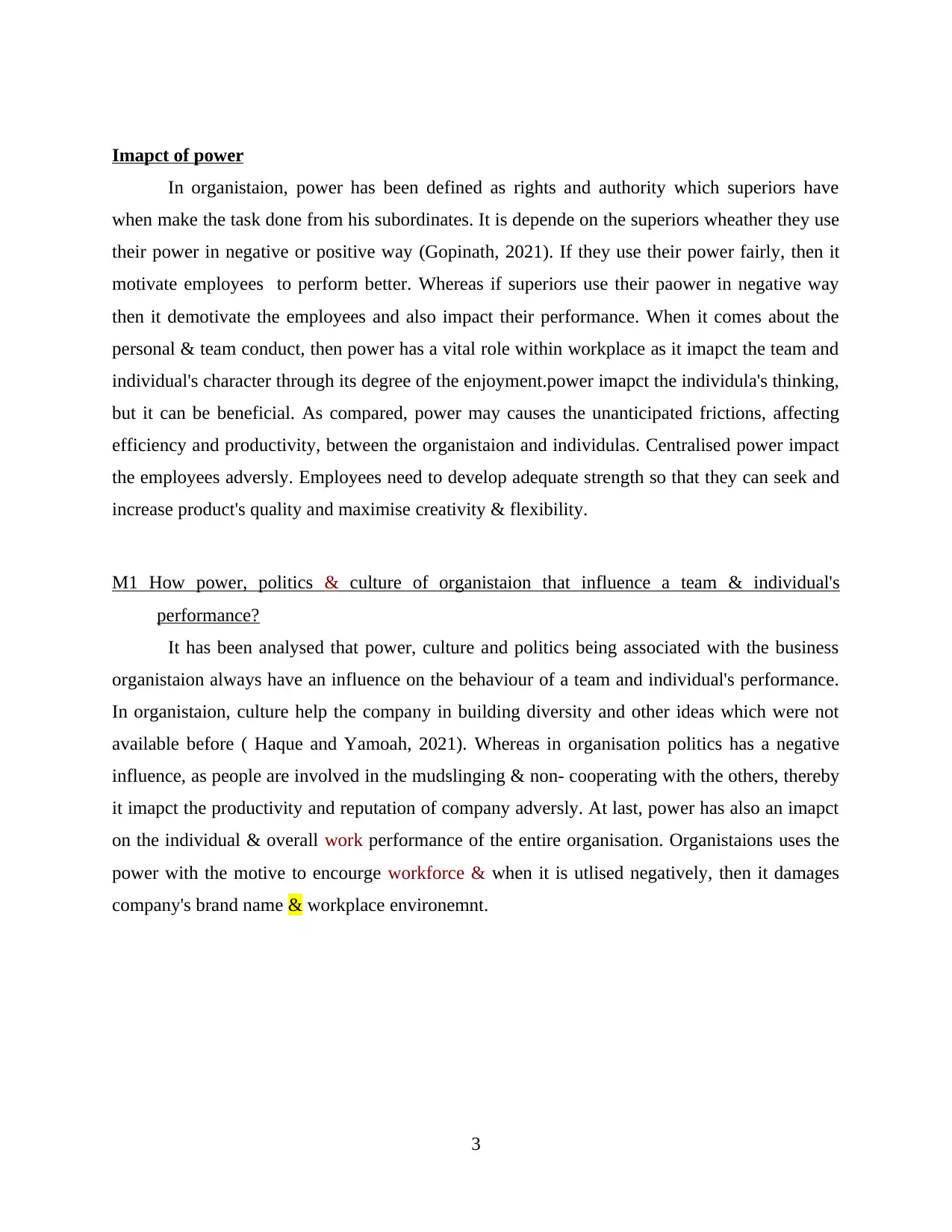
Imapct of power
In organistaion, power has been defined as rights and authority which superiors have
when make the task done from his subordinates. It is depende on the superiors wheather they use
their power in negative or positive way (Gopinath, 2021). If they use their power fairly, then it
motivate employees to perform better. Whereas if superiors use their paower in negative way
then it demotivate the employees and also impact their performance. When it comes about the
personal & team conduct, then power has a vital role within workplace as it imapct the team and
individual's character through its degree of the enjoyment.power imapct the individula's thinking,
but it can be beneficial. As compared, power may causes the unanticipated frictions, affecting
efficiency and productivity, between the organistaion and individulas. Centralised power impact
the employees adversly. Employees need to develop adequate strength so that they can seek and
increase product's quality and maximise creativity & flexibility.
M1 How power, politics & culture of organistaion that influence a team & individual's
performance?
It has been analysed that power, culture and politics being associated with the business
organistaion always have an influence on the behaviour of a team and individual's performance.
In organistaion, culture help the company in building diversity and other ideas which were not
available before ( Haque and Yamoah, 2021). Whereas in organisation politics has a negative
influence, as people are involved in the mudslinging & non- cooperating with the others, thereby
it imapct the productivity and reputation of company adversly. At last, power has also an imapct
on the individual & overall work performance of the entire organisation. Organistaions uses the
power with the motive to encourge workforce & when it is utlised negatively, then it damages
company's brand name & workplace environemnt.
3
In organistaion, power has been defined as rights and authority which superiors have
when make the task done from his subordinates. It is depende on the superiors wheather they use
their power in negative or positive way (Gopinath, 2021). If they use their power fairly, then it
motivate employees to perform better. Whereas if superiors use their paower in negative way
then it demotivate the employees and also impact their performance. When it comes about the
personal & team conduct, then power has a vital role within workplace as it imapct the team and
individual's character through its degree of the enjoyment.power imapct the individula's thinking,
but it can be beneficial. As compared, power may causes the unanticipated frictions, affecting
efficiency and productivity, between the organistaion and individulas. Centralised power impact
the employees adversly. Employees need to develop adequate strength so that they can seek and
increase product's quality and maximise creativity & flexibility.
M1 How power, politics & culture of organistaion that influence a team & individual's
performance?
It has been analysed that power, culture and politics being associated with the business
organistaion always have an influence on the behaviour of a team and individual's performance.
In organistaion, culture help the company in building diversity and other ideas which were not
available before ( Haque and Yamoah, 2021). Whereas in organisation politics has a negative
influence, as people are involved in the mudslinging & non- cooperating with the others, thereby
it imapct the productivity and reputation of company adversly. At last, power has also an imapct
on the individual & overall work performance of the entire organisation. Organistaions uses the
power with the motive to encourge workforce & when it is utlised negatively, then it damages
company's brand name & workplace environemnt.
3
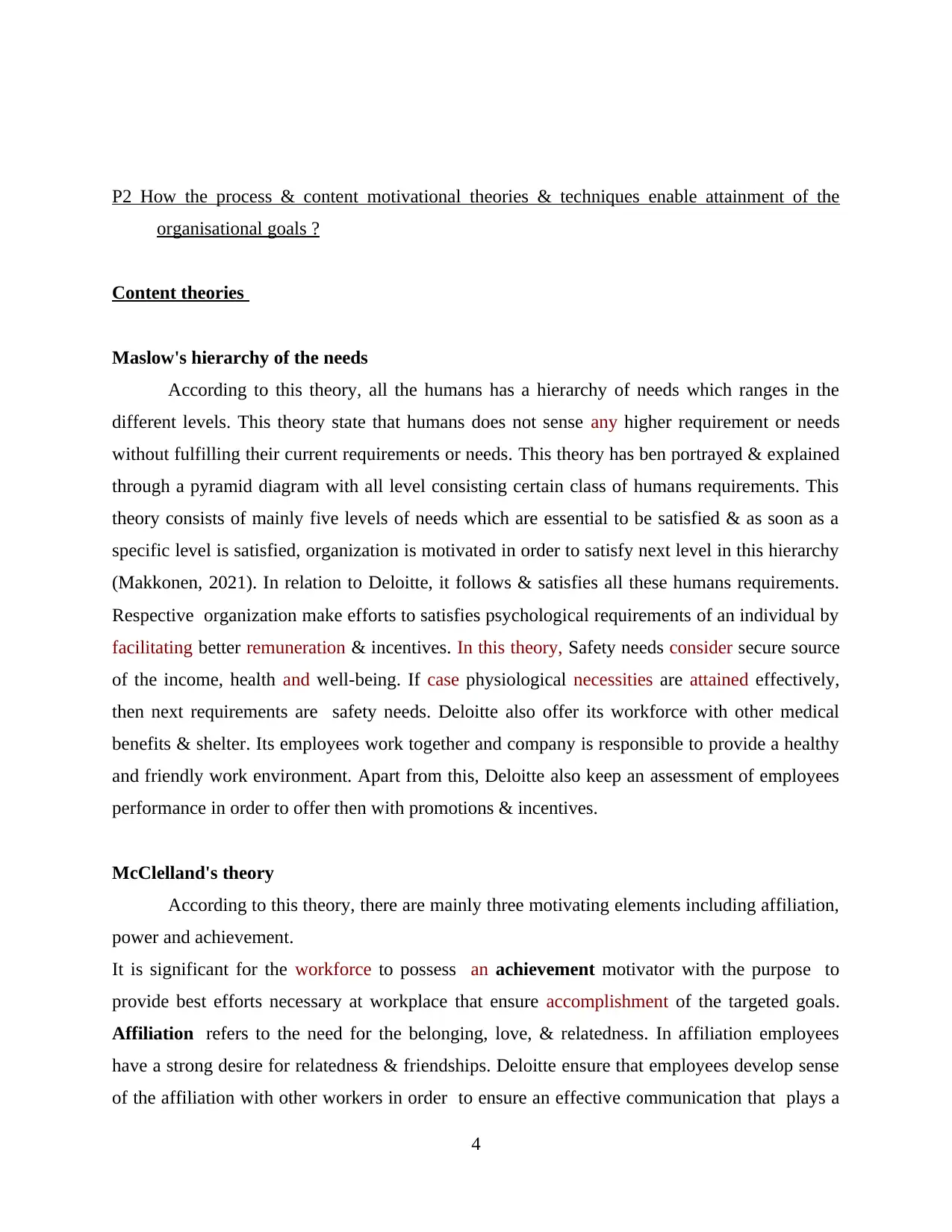
P2 How the process & content motivational theories & techniques enable attainment of the
organisational goals ?
Content theories
Maslow's hierarchy of the needs
According to this theory, all the humans has a hierarchy of needs which ranges in the
different levels. This theory state that humans does not sense any higher requirement or needs
without fulfilling their current requirements or needs. This theory has ben portrayed & explained
through a pyramid diagram with all level consisting certain class of humans requirements. This
theory consists of mainly five levels of needs which are essential to be satisfied & as soon as a
specific level is satisfied, organization is motivated in order to satisfy next level in this hierarchy
(Makkonen, 2021). In relation to Deloitte, it follows & satisfies all these humans requirements.
Respective organization make efforts to satisfies psychological requirements of an individual by
facilitating better remuneration & incentives. In this theory, Safety needs consider secure source
of the income, health and well-being. If case physiological necessities are attained effectively,
then next requirements are safety needs. Deloitte also offer its workforce with other medical
benefits & shelter. Its employees work together and company is responsible to provide a healthy
and friendly work environment. Apart from this, Deloitte also keep an assessment of employees
performance in order to offer then with promotions & incentives.
McClelland's theory
According to this theory, there are mainly three motivating elements including affiliation,
power and achievement.
It is significant for the workforce to possess an achievement motivator with the purpose to
provide best efforts necessary at workplace that ensure accomplishment of the targeted goals.
Affiliation refers to the need for the belonging, love, & relatedness. In affiliation employees
have a strong desire for relatedness & friendships. Deloitte ensure that employees develop sense
of the affiliation with other workers in order to ensure an effective communication that plays a
4
organisational goals ?
Content theories
Maslow's hierarchy of the needs
According to this theory, all the humans has a hierarchy of needs which ranges in the
different levels. This theory state that humans does not sense any higher requirement or needs
without fulfilling their current requirements or needs. This theory has ben portrayed & explained
through a pyramid diagram with all level consisting certain class of humans requirements. This
theory consists of mainly five levels of needs which are essential to be satisfied & as soon as a
specific level is satisfied, organization is motivated in order to satisfy next level in this hierarchy
(Makkonen, 2021). In relation to Deloitte, it follows & satisfies all these humans requirements.
Respective organization make efforts to satisfies psychological requirements of an individual by
facilitating better remuneration & incentives. In this theory, Safety needs consider secure source
of the income, health and well-being. If case physiological necessities are attained effectively,
then next requirements are safety needs. Deloitte also offer its workforce with other medical
benefits & shelter. Its employees work together and company is responsible to provide a healthy
and friendly work environment. Apart from this, Deloitte also keep an assessment of employees
performance in order to offer then with promotions & incentives.
McClelland's theory
According to this theory, there are mainly three motivating elements including affiliation,
power and achievement.
It is significant for the workforce to possess an achievement motivator with the purpose to
provide best efforts necessary at workplace that ensure accomplishment of the targeted goals.
Affiliation refers to the need for the belonging, love, & relatedness. In affiliation employees
have a strong desire for relatedness & friendships. Deloitte ensure that employees develop sense
of the affiliation with other workers in order to ensure an effective communication that plays a
4
⊘ This is a preview!⊘
Do you want full access?
Subscribe today to unlock all pages.

Trusted by 1+ million students worldwide
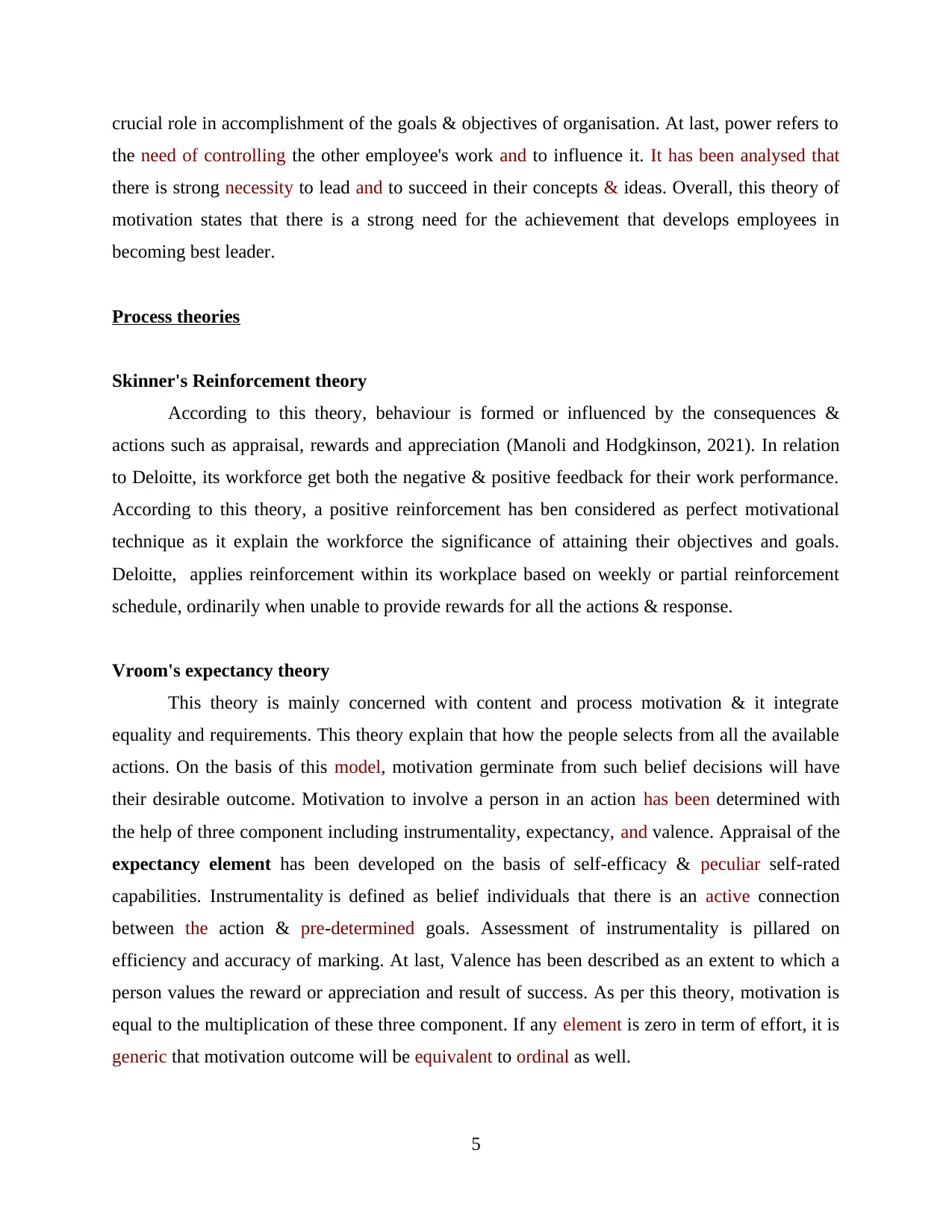
crucial role in accomplishment of the goals & objectives of organisation. At last, power refers to
the need of controlling the other employee's work and to influence it. It has been analysed that
there is strong necessity to lead and to succeed in their concepts & ideas. Overall, this theory of
motivation states that there is a strong need for the achievement that develops employees in
becoming best leader.
Process theories
Skinner's Reinforcement theory
According to this theory, behaviour is formed or influenced by the consequences &
actions such as appraisal, rewards and appreciation (Manoli and Hodgkinson, 2021). In relation
to Deloitte, its workforce get both the negative & positive feedback for their work performance.
According to this theory, a positive reinforcement has ben considered as perfect motivational
technique as it explain the workforce the significance of attaining their objectives and goals.
Deloitte, applies reinforcement within its workplace based on weekly or partial reinforcement
schedule, ordinarily when unable to provide rewards for all the actions & response.
Vroom's expectancy theory
This theory is mainly concerned with content and process motivation & it integrate
equality and requirements. This theory explain that how the people selects from all the available
actions. On the basis of this model, motivation germinate from such belief decisions will have
their desirable outcome. Motivation to involve a person in an action has been determined with
the help of three component including instrumentality, expectancy, and valence. Appraisal of the
expectancy element has been developed on the basis of self-efficacy & peculiar self-rated
capabilities. Instrumentality is defined as belief individuals that there is an active connection
between the action & pre-determined goals. Assessment of instrumentality is pillared on
efficiency and accuracy of marking. At last, Valence has been described as an extent to which a
person values the reward or appreciation and result of success. As per this theory, motivation is
equal to the multiplication of these three component. If any element is zero in term of effort, it is
generic that motivation outcome will be equivalent to ordinal as well.
5
the need of controlling the other employee's work and to influence it. It has been analysed that
there is strong necessity to lead and to succeed in their concepts & ideas. Overall, this theory of
motivation states that there is a strong need for the achievement that develops employees in
becoming best leader.
Process theories
Skinner's Reinforcement theory
According to this theory, behaviour is formed or influenced by the consequences &
actions such as appraisal, rewards and appreciation (Manoli and Hodgkinson, 2021). In relation
to Deloitte, its workforce get both the negative & positive feedback for their work performance.
According to this theory, a positive reinforcement has ben considered as perfect motivational
technique as it explain the workforce the significance of attaining their objectives and goals.
Deloitte, applies reinforcement within its workplace based on weekly or partial reinforcement
schedule, ordinarily when unable to provide rewards for all the actions & response.
Vroom's expectancy theory
This theory is mainly concerned with content and process motivation & it integrate
equality and requirements. This theory explain that how the people selects from all the available
actions. On the basis of this model, motivation germinate from such belief decisions will have
their desirable outcome. Motivation to involve a person in an action has been determined with
the help of three component including instrumentality, expectancy, and valence. Appraisal of the
expectancy element has been developed on the basis of self-efficacy & peculiar self-rated
capabilities. Instrumentality is defined as belief individuals that there is an active connection
between the action & pre-determined goals. Assessment of instrumentality is pillared on
efficiency and accuracy of marking. At last, Valence has been described as an extent to which a
person values the reward or appreciation and result of success. As per this theory, motivation is
equal to the multiplication of these three component. If any element is zero in term of effort, it is
generic that motivation outcome will be equivalent to ordinal as well.
5
Paraphrase This Document
Need a fresh take? Get an instant paraphrase of this document with our AI Paraphraser
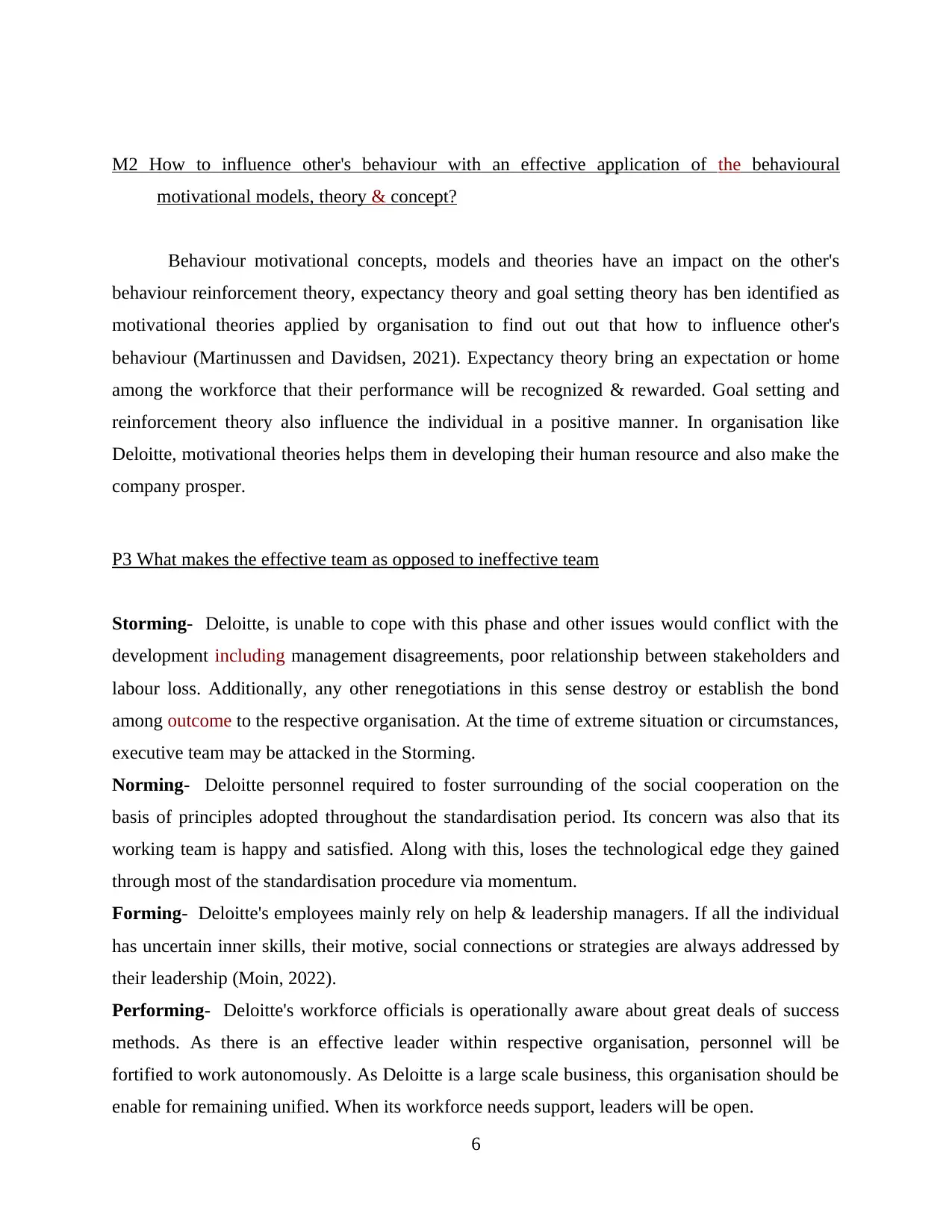
M2 How to influence other's behaviour with an effective application of the behavioural
motivational models, theory & concept?
Behaviour motivational concepts, models and theories have an impact on the other's
behaviour reinforcement theory, expectancy theory and goal setting theory has ben identified as
motivational theories applied by organisation to find out out that how to influence other's
behaviour (Martinussen and Davidsen, 2021). Expectancy theory bring an expectation or home
among the workforce that their performance will be recognized & rewarded. Goal setting and
reinforcement theory also influence the individual in a positive manner. In organisation like
Deloitte, motivational theories helps them in developing their human resource and also make the
company prosper.
P3 What makes the effective team as opposed to ineffective team
Storming- Deloitte, is unable to cope with this phase and other issues would conflict with the
development including management disagreements, poor relationship between stakeholders and
labour loss. Additionally, any other renegotiations in this sense destroy or establish the bond
among outcome to the respective organisation. At the time of extreme situation or circumstances,
executive team may be attacked in the Storming.
Norming- Deloitte personnel required to foster surrounding of the social cooperation on the
basis of principles adopted throughout the standardisation period. Its concern was also that its
working team is happy and satisfied. Along with this, loses the technological edge they gained
through most of the standardisation procedure via momentum.
Forming- Deloitte's employees mainly rely on help & leadership managers. If all the individual
has uncertain inner skills, their motive, social connections or strategies are always addressed by
their leadership (Moin, 2022).
Performing- Deloitte's workforce officials is operationally aware about great deals of success
methods. As there is an effective leader within respective organisation, personnel will be
fortified to work autonomously. As Deloitte is a large scale business, this organisation should be
enable for remaining unified. When its workforce needs support, leaders will be open.
6
motivational models, theory & concept?
Behaviour motivational concepts, models and theories have an impact on the other's
behaviour reinforcement theory, expectancy theory and goal setting theory has ben identified as
motivational theories applied by organisation to find out out that how to influence other's
behaviour (Martinussen and Davidsen, 2021). Expectancy theory bring an expectation or home
among the workforce that their performance will be recognized & rewarded. Goal setting and
reinforcement theory also influence the individual in a positive manner. In organisation like
Deloitte, motivational theories helps them in developing their human resource and also make the
company prosper.
P3 What makes the effective team as opposed to ineffective team
Storming- Deloitte, is unable to cope with this phase and other issues would conflict with the
development including management disagreements, poor relationship between stakeholders and
labour loss. Additionally, any other renegotiations in this sense destroy or establish the bond
among outcome to the respective organisation. At the time of extreme situation or circumstances,
executive team may be attacked in the Storming.
Norming- Deloitte personnel required to foster surrounding of the social cooperation on the
basis of principles adopted throughout the standardisation period. Its concern was also that its
working team is happy and satisfied. Along with this, loses the technological edge they gained
through most of the standardisation procedure via momentum.
Forming- Deloitte's employees mainly rely on help & leadership managers. If all the individual
has uncertain inner skills, their motive, social connections or strategies are always addressed by
their leadership (Moin, 2022).
Performing- Deloitte's workforce officials is operationally aware about great deals of success
methods. As there is an effective leader within respective organisation, personnel will be
fortified to work autonomously. As Deloitte is a large scale business, this organisation should be
enable for remaining unified. When its workforce needs support, leaders will be open.
6
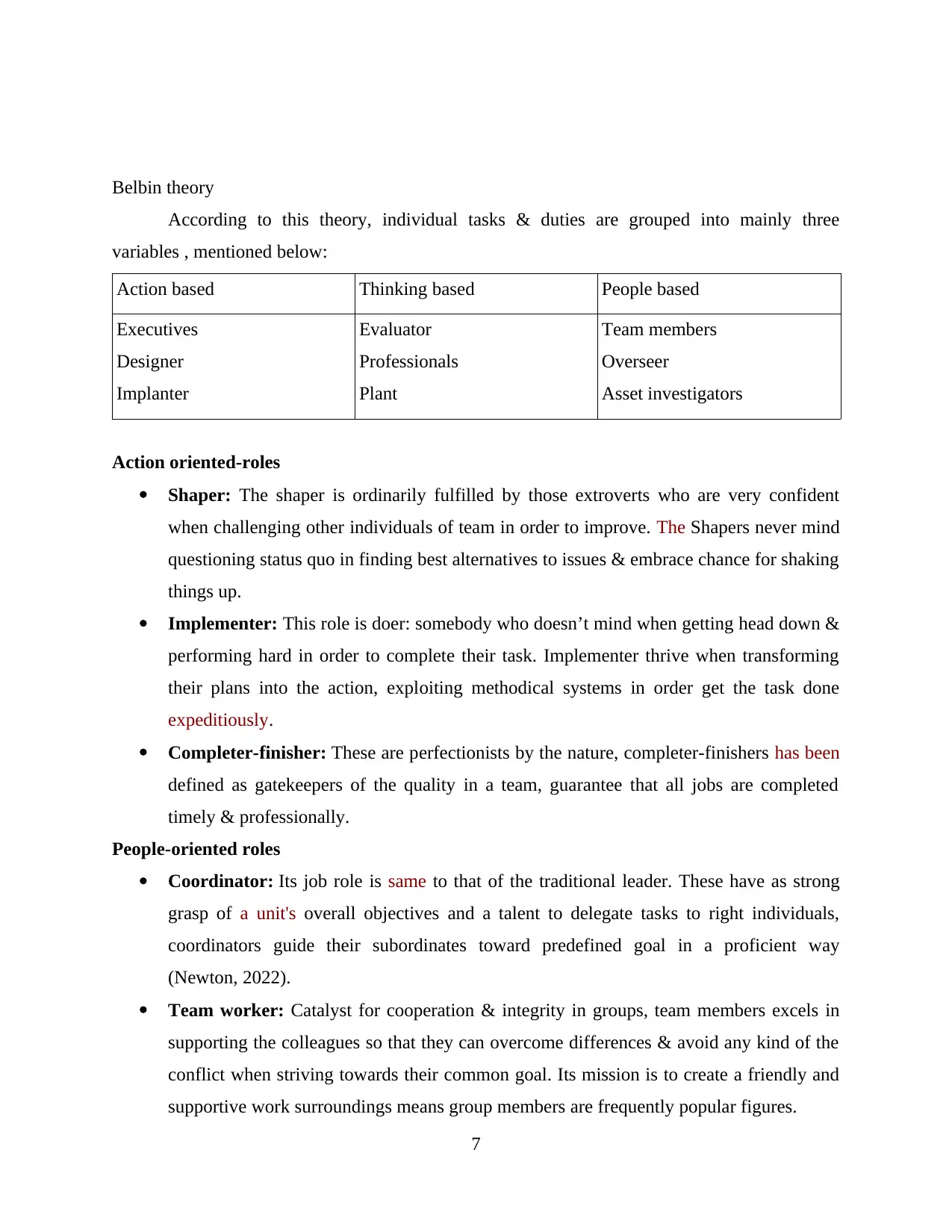
Belbin theory
According to this theory, individual tasks & duties are grouped into mainly three
variables , mentioned below:
Action based Thinking based People based
Executives
Designer
Implanter
Evaluator
Professionals
Plant
Team members
Overseer
Asset investigators
Action oriented-roles
Shaper: The shaper is ordinarily fulfilled by those extroverts who are very confident
when challenging other individuals of team in order to improve. The Shapers never mind
questioning status quo in finding best alternatives to issues & embrace chance for shaking
things up.
Implementer: This role is doer: somebody who doesn’t mind when getting head down &
performing hard in order to complete their task. Implementer thrive when transforming
their plans into the action, exploiting methodical systems in order get the task done
expeditiously.
Completer-finisher: These are perfectionists by the nature, completer-finishers has been
defined as gatekeepers of the quality in a team, guarantee that all jobs are completed
timely & professionally.
People-oriented roles
Coordinator: Its job role is same to that of the traditional leader. These have as strong
grasp of a unit's overall objectives and a talent to delegate tasks to right individuals,
coordinators guide their subordinates toward predefined goal in a proficient way
(Newton, 2022).
Team worker: Catalyst for cooperation & integrity in groups, team members excels in
supporting the colleagues so that they can overcome differences & avoid any kind of the
conflict when striving towards their common goal. Its mission is to create a friendly and
supportive work surroundings means group members are frequently popular figures.
7
According to this theory, individual tasks & duties are grouped into mainly three
variables , mentioned below:
Action based Thinking based People based
Executives
Designer
Implanter
Evaluator
Professionals
Plant
Team members
Overseer
Asset investigators
Action oriented-roles
Shaper: The shaper is ordinarily fulfilled by those extroverts who are very confident
when challenging other individuals of team in order to improve. The Shapers never mind
questioning status quo in finding best alternatives to issues & embrace chance for shaking
things up.
Implementer: This role is doer: somebody who doesn’t mind when getting head down &
performing hard in order to complete their task. Implementer thrive when transforming
their plans into the action, exploiting methodical systems in order get the task done
expeditiously.
Completer-finisher: These are perfectionists by the nature, completer-finishers has been
defined as gatekeepers of the quality in a team, guarantee that all jobs are completed
timely & professionally.
People-oriented roles
Coordinator: Its job role is same to that of the traditional leader. These have as strong
grasp of a unit's overall objectives and a talent to delegate tasks to right individuals,
coordinators guide their subordinates toward predefined goal in a proficient way
(Newton, 2022).
Team worker: Catalyst for cooperation & integrity in groups, team members excels in
supporting the colleagues so that they can overcome differences & avoid any kind of the
conflict when striving towards their common goal. Its mission is to create a friendly and
supportive work surroundings means group members are frequently popular figures.
7
⊘ This is a preview!⊘
Do you want full access?
Subscribe today to unlock all pages.

Trusted by 1+ million students worldwide
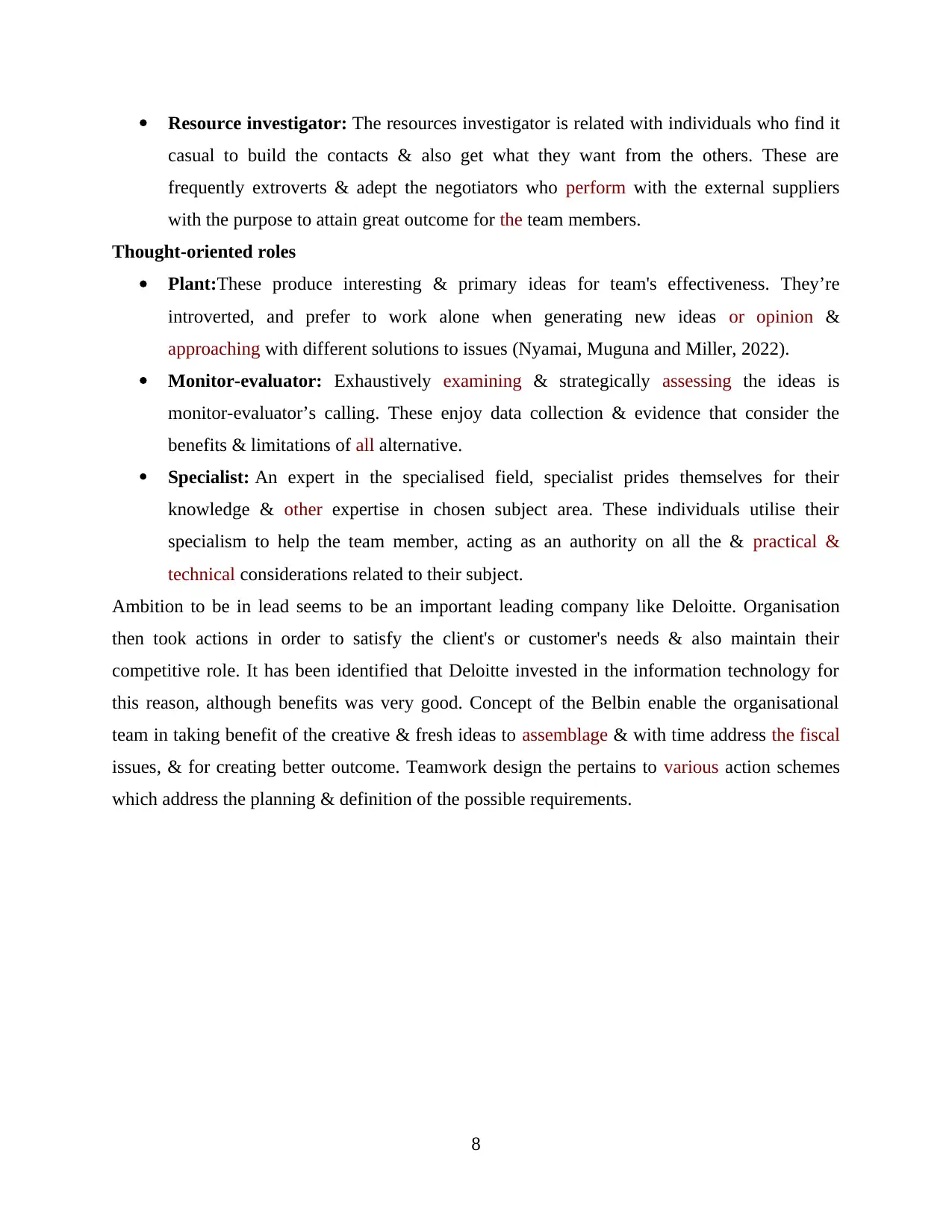
Resource investigator: The resources investigator is related with individuals who find it
casual to build the contacts & also get what they want from the others. These are
frequently extroverts & adept the negotiators who perform with the external suppliers
with the purpose to attain great outcome for the team members.
Thought-oriented roles
Plant:These produce interesting & primary ideas for team's effectiveness. They’re
introverted, and prefer to work alone when generating new ideas or opinion &
approaching with different solutions to issues (Nyamai, Muguna and Miller, 2022).
Monitor-evaluator: Exhaustively examining & strategically assessing the ideas is
monitor-evaluator’s calling. These enjoy data collection & evidence that consider the
benefits & limitations of all alternative.
Specialist: An expert in the specialised field, specialist prides themselves for their
knowledge & other expertise in chosen subject area. These individuals utilise their
specialism to help the team member, acting as an authority on all the & practical &
technical considerations related to their subject.
Ambition to be in lead seems to be an important leading company like Deloitte. Organisation
then took actions in order to satisfy the client's or customer's needs & also maintain their
competitive role. It has been identified that Deloitte invested in the information technology for
this reason, although benefits was very good. Concept of the Belbin enable the organisational
team in taking benefit of the creative & fresh ideas to assemblage & with time address the fiscal
issues, & for creating better outcome. Teamwork design the pertains to various action schemes
which address the planning & definition of the possible requirements.
8
casual to build the contacts & also get what they want from the others. These are
frequently extroverts & adept the negotiators who perform with the external suppliers
with the purpose to attain great outcome for the team members.
Thought-oriented roles
Plant:These produce interesting & primary ideas for team's effectiveness. They’re
introverted, and prefer to work alone when generating new ideas or opinion &
approaching with different solutions to issues (Nyamai, Muguna and Miller, 2022).
Monitor-evaluator: Exhaustively examining & strategically assessing the ideas is
monitor-evaluator’s calling. These enjoy data collection & evidence that consider the
benefits & limitations of all alternative.
Specialist: An expert in the specialised field, specialist prides themselves for their
knowledge & other expertise in chosen subject area. These individuals utilise their
specialism to help the team member, acting as an authority on all the & practical &
technical considerations related to their subject.
Ambition to be in lead seems to be an important leading company like Deloitte. Organisation
then took actions in order to satisfy the client's or customer's needs & also maintain their
competitive role. It has been identified that Deloitte invested in the information technology for
this reason, although benefits was very good. Concept of the Belbin enable the organisational
team in taking benefit of the creative & fresh ideas to assemblage & with time address the fiscal
issues, & for creating better outcome. Teamwork design the pertains to various action schemes
which address the planning & definition of the possible requirements.
8
Paraphrase This Document
Need a fresh take? Get an instant paraphrase of this document with our AI Paraphraser
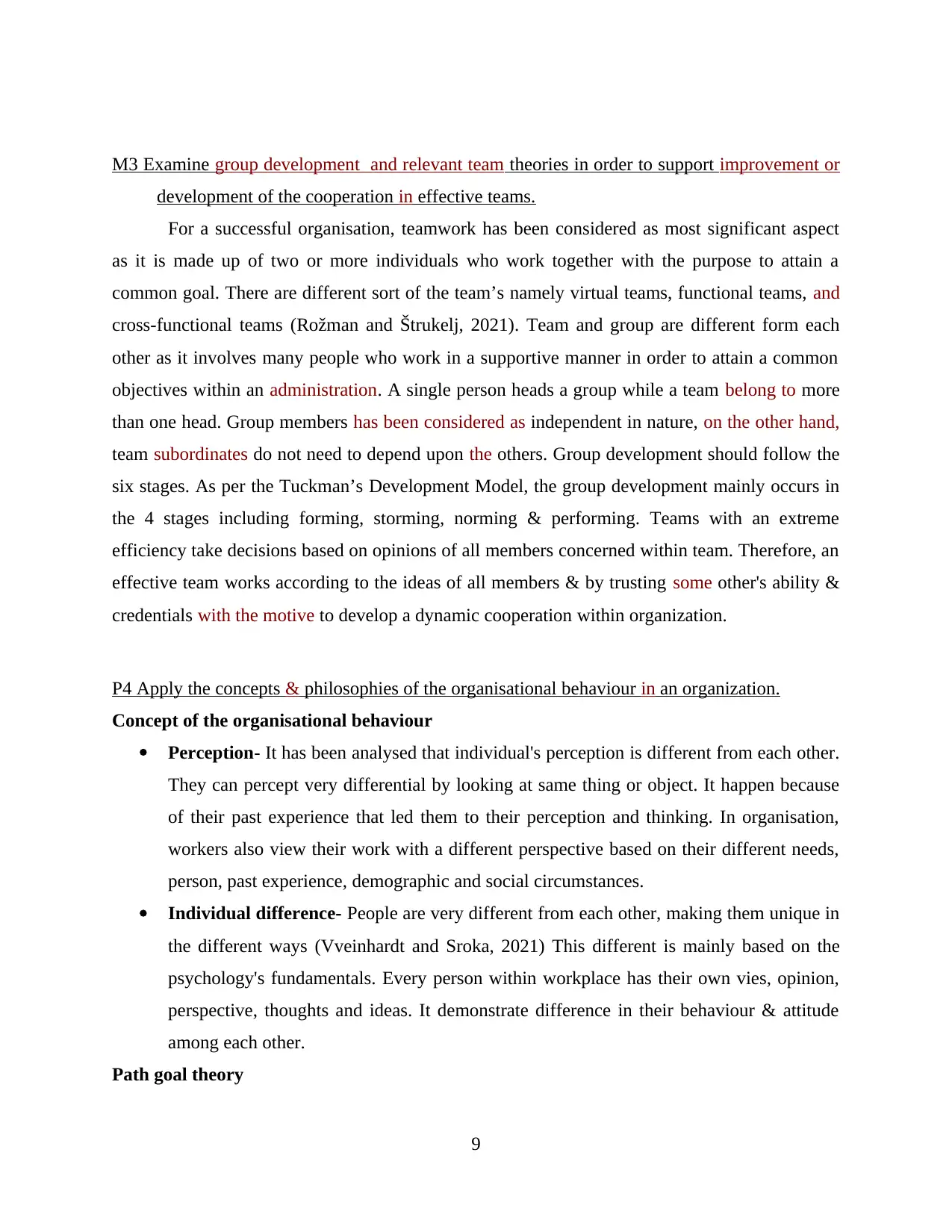
M3 Examine group development and relevant team theories in order to support improvement or
development of the cooperation in effective teams.
For a successful organisation, teamwork has been considered as most significant aspect
as it is made up of two or more individuals who work together with the purpose to attain a
common goal. There are different sort of the team’s namely virtual teams, functional teams, and
cross-functional teams (Rožman and Štrukelj, 2021). Team and group are different form each
other as it involves many people who work in a supportive manner in order to attain a common
objectives within an administration. A single person heads a group while a team belong to more
than one head. Group members has been considered as independent in nature, on the other hand,
team subordinates do not need to depend upon the others. Group development should follow the
six stages. As per the Tuckman’s Development Model, the group development mainly occurs in
the 4 stages including forming, storming, norming & performing. Teams with an extreme
efficiency take decisions based on opinions of all members concerned within team. Therefore, an
effective team works according to the ideas of all members & by trusting some other's ability &
credentials with the motive to develop a dynamic cooperation within organization.
P4 Apply the concepts & philosophies of the organisational behaviour in an organization.
Concept of the organisational behaviour
Perception- It has been analysed that individual's perception is different from each other.
They can percept very differential by looking at same thing or object. It happen because
of their past experience that led them to their perception and thinking. In organisation,
workers also view their work with a different perspective based on their different needs,
person, past experience, demographic and social circumstances.
Individual difference- People are very different from each other, making them unique in
the different ways (Vveinhardt and Sroka, 2021) This different is mainly based on the
psychology's fundamentals. Every person within workplace has their own vies, opinion,
perspective, thoughts and ideas. It demonstrate difference in their behaviour & attitude
among each other.
Path goal theory
9
development of the cooperation in effective teams.
For a successful organisation, teamwork has been considered as most significant aspect
as it is made up of two or more individuals who work together with the purpose to attain a
common goal. There are different sort of the team’s namely virtual teams, functional teams, and
cross-functional teams (Rožman and Štrukelj, 2021). Team and group are different form each
other as it involves many people who work in a supportive manner in order to attain a common
objectives within an administration. A single person heads a group while a team belong to more
than one head. Group members has been considered as independent in nature, on the other hand,
team subordinates do not need to depend upon the others. Group development should follow the
six stages. As per the Tuckman’s Development Model, the group development mainly occurs in
the 4 stages including forming, storming, norming & performing. Teams with an extreme
efficiency take decisions based on opinions of all members concerned within team. Therefore, an
effective team works according to the ideas of all members & by trusting some other's ability &
credentials with the motive to develop a dynamic cooperation within organization.
P4 Apply the concepts & philosophies of the organisational behaviour in an organization.
Concept of the organisational behaviour
Perception- It has been analysed that individual's perception is different from each other.
They can percept very differential by looking at same thing or object. It happen because
of their past experience that led them to their perception and thinking. In organisation,
workers also view their work with a different perspective based on their different needs,
person, past experience, demographic and social circumstances.
Individual difference- People are very different from each other, making them unique in
the different ways (Vveinhardt and Sroka, 2021) This different is mainly based on the
psychology's fundamentals. Every person within workplace has their own vies, opinion,
perspective, thoughts and ideas. It demonstrate difference in their behaviour & attitude
among each other.
Path goal theory
9
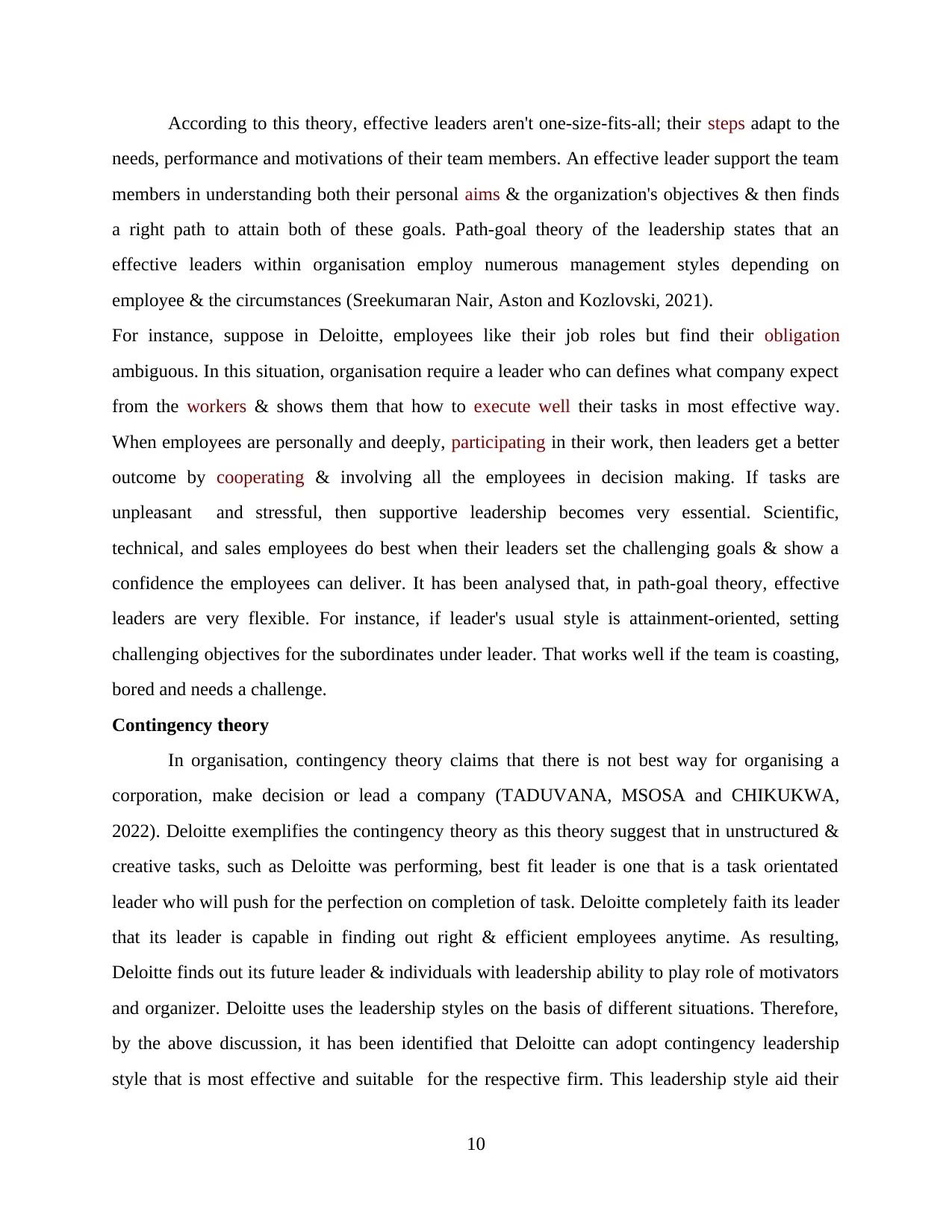
According to this theory, effective leaders aren't one-size-fits-all; their steps adapt to the
needs, performance and motivations of their team members. An effective leader support the team
members in understanding both their personal aims & the organization's objectives & then finds
a right path to attain both of these goals. Path-goal theory of the leadership states that an
effective leaders within organisation employ numerous management styles depending on
employee & the circumstances (Sreekumaran Nair, Aston and Kozlovski, 2021).
For instance, suppose in Deloitte, employees like their job roles but find their obligation
ambiguous. In this situation, organisation require a leader who can defines what company expect
from the workers & shows them that how to execute well their tasks in most effective way.
When employees are personally and deeply, participating in their work, then leaders get a better
outcome by cooperating & involving all the employees in decision making. If tasks are
unpleasant and stressful, then supportive leadership becomes very essential. Scientific,
technical, and sales employees do best when their leaders set the challenging goals & show a
confidence the employees can deliver. It has been analysed that, in path-goal theory, effective
leaders are very flexible. For instance, if leader's usual style is attainment-oriented, setting
challenging objectives for the subordinates under leader. That works well if the team is coasting,
bored and needs a challenge.
Contingency theory
In organisation, contingency theory claims that there is not best way for organising a
corporation, make decision or lead a company (TADUVANA, MSOSA and CHIKUKWA,
2022). Deloitte exemplifies the contingency theory as this theory suggest that in unstructured &
creative tasks, such as Deloitte was performing, best fit leader is one that is a task orientated
leader who will push for the perfection on completion of task. Deloitte completely faith its leader
that its leader is capable in finding out right & efficient employees anytime. As resulting,
Deloitte finds out its future leader & individuals with leadership ability to play role of motivators
and organizer. Deloitte uses the leadership styles on the basis of different situations. Therefore,
by the above discussion, it has been identified that Deloitte can adopt contingency leadership
style that is most effective and suitable for the respective firm. This leadership style aid their
10
needs, performance and motivations of their team members. An effective leader support the team
members in understanding both their personal aims & the organization's objectives & then finds
a right path to attain both of these goals. Path-goal theory of the leadership states that an
effective leaders within organisation employ numerous management styles depending on
employee & the circumstances (Sreekumaran Nair, Aston and Kozlovski, 2021).
For instance, suppose in Deloitte, employees like their job roles but find their obligation
ambiguous. In this situation, organisation require a leader who can defines what company expect
from the workers & shows them that how to execute well their tasks in most effective way.
When employees are personally and deeply, participating in their work, then leaders get a better
outcome by cooperating & involving all the employees in decision making. If tasks are
unpleasant and stressful, then supportive leadership becomes very essential. Scientific,
technical, and sales employees do best when their leaders set the challenging goals & show a
confidence the employees can deliver. It has been analysed that, in path-goal theory, effective
leaders are very flexible. For instance, if leader's usual style is attainment-oriented, setting
challenging objectives for the subordinates under leader. That works well if the team is coasting,
bored and needs a challenge.
Contingency theory
In organisation, contingency theory claims that there is not best way for organising a
corporation, make decision or lead a company (TADUVANA, MSOSA and CHIKUKWA,
2022). Deloitte exemplifies the contingency theory as this theory suggest that in unstructured &
creative tasks, such as Deloitte was performing, best fit leader is one that is a task orientated
leader who will push for the perfection on completion of task. Deloitte completely faith its leader
that its leader is capable in finding out right & efficient employees anytime. As resulting,
Deloitte finds out its future leader & individuals with leadership ability to play role of motivators
and organizer. Deloitte uses the leadership styles on the basis of different situations. Therefore,
by the above discussion, it has been identified that Deloitte can adopt contingency leadership
style that is most effective and suitable for the respective firm. This leadership style aid their
10
⊘ This is a preview!⊘
Do you want full access?
Subscribe today to unlock all pages.

Trusted by 1+ million students worldwide
1 out of 16
Related Documents
Your All-in-One AI-Powered Toolkit for Academic Success.
+13062052269
info@desklib.com
Available 24*7 on WhatsApp / Email
![[object Object]](/_next/static/media/star-bottom.7253800d.svg)
Unlock your academic potential
Copyright © 2020–2026 A2Z Services. All Rights Reserved. Developed and managed by ZUCOL.



